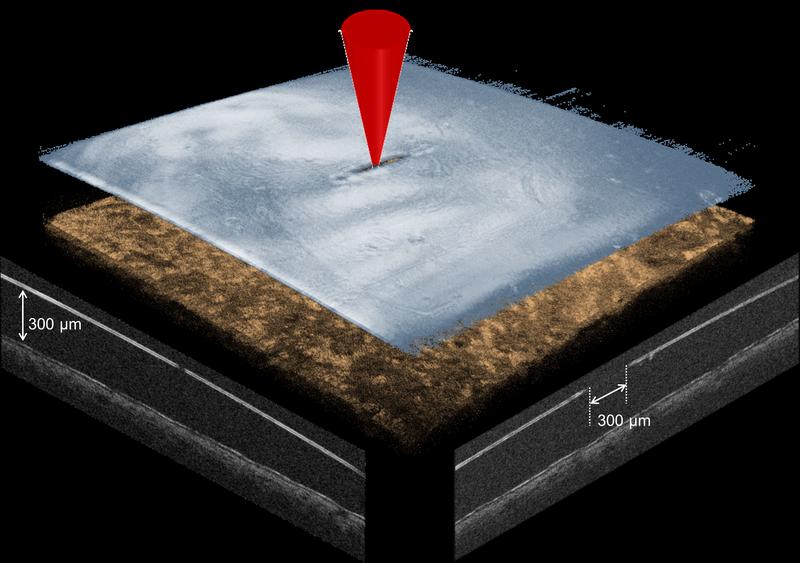
Advancements in Laser Eye Surgery with Optical Coherence Tomography

3-D OCT projection of an fs laser membrane cut (symbolic laser focus in red). The membrane in blue is only 300 µm from the prepared porcine retina in brown.
Illustration: LZH
In the established femtosecond laser-assisted in situ keratomileusis (fs LASIK), the cornea is cut open using the laser to subsequently correct the defective vision. In order to treat presbyopia however, the tissue has to be cut deeper.
The scientists at the LZH and their industrial partners use an fs laser for precisely cutting the lens, creating slip planes and thus making the lens more flexible.
Cutting the eye lens with the laser, without damage
This treatment becomes only possible through an effective visualization of the eye tissue. For this, the Image Guided Laser Surgery Group of the Biomedical Optics Department of the LZH has adapted an OCT imaging unit from the ROWIAK GmbH.
With this and a special software it is possible to image the cutting of the eye as well as the laser beam delivery during the operation. Within the project cuts into the eye have already been done without damaging neither the front nor the rear part of the lens capsule. In current clinical studies, the ROWIAK GmbH is further examining this process.
Removing retina adhesions, without opening the eye
In order to remove retina adhesions, currently the eye must be opened and the vitreous body removed. The scientists at the LZH have integrated adaptive optics into an fs laser system, to be able to cut close to the retina.
First results have already been established on the retina of pig eyes: with this system, model membranes only a few hundred micrometers away from the retina have been cut; the retina tissue directly behind it showed no noticeable damage.
In the project “Innovative cataract, presbyopia and retinal treatment using ultrashort laser pulses” (IKARUS), the following partners apart from the LZH and the ROWIAK GmbH (Hannover) as the system manufacturer have been involved: QIOPTIQ Photonics GmbH & Co. KG (Göttingen) as optics designers, ARGES GmbH (Wackersdorf) for laser scanner systems, and the Laserforum Köln e.V. (Cologne) for clinical consulting and for measuring of the eyes. IKARUS was supported by the German Federal Ministry of Education and Research (BMBF) within the research alliance “Ultrakurzpulslaser”.












